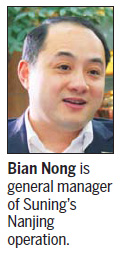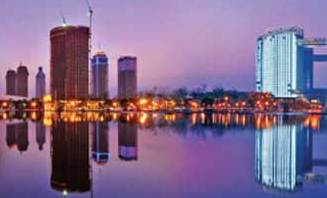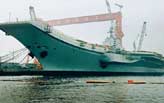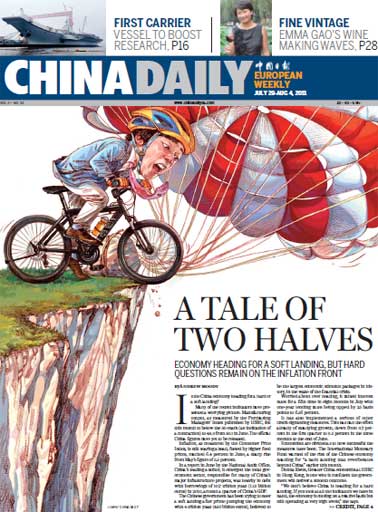Ringing success
Updated: 2011-07-22 12:39
By Wang Chao (China Daily European Weekly)
"Shanghai is an international city which serves consumers from all over the country, and is certainly the destination for high-end consumers. Nanjing, on the other hand, targets middle-class consumers' needs," says an official from the Nanjing Commerce Commission on condition of anonymity.
Roger H. Wang, a Chinese-American, was one of the earliest witnesses of the retail revolution in Nanjing. When Wang invested 750 million yuan to open the first Golden Eagle mall in Nanjing in 1992, little did he know that soon he would be one of the richest Chinese-Americans in the world.
The 63-year-old, with assets of $4.2 billion (2.97 billion euros), is now the seventh wealthiest Chinese in the United States, and 36th in the world, according to Forbes' 2011 rankings.
Nanjing apparently didn't disappoint Wang. The Golden Eagle group has since expanded into an empire with 21 shopping malls, with a market value of over 50 billion yuan. Its most successful segment, the cosmetics department selling French brands, generated 60 million yuan in revenue in 2010, within a 50-square-meter counter. Kong boasted it as the "most profitable counter in China".
"Nanjing has more than 300,000 middle-class families with annual revenue of over 100,000 yuan and they are our target customers," says Kong. "We are not targeting the top of the pyramid, but the emerging middle class, which is the backbone of purchase in Nanjing, as well as in China."
Being the former capital of 10 dynasties, Nanjing seems to have inherited prosperity, high living standards and the spirit of entrepreneurship over the years.
During the early 1980s when most Chinese flocked to chase positions in State-owned companies, several retailers like Suning, now a top Chinese home appliances retailer, Suguo and Golden Eagle decided to focus on Nanjing.
Yin Rending, vice-general manager of Suguo Supermarket Co Ltd, says that most Nanjing people have business genes in them.
"Retail trade is a traditional occupation in eastern China, and 'Jiangsu businessmen' were an influential group in China's history. Besides, Jiangsu is a prosperous place with strong purchasing power, making it the ideal location and the potential target market for retail business."
Starting off as a fruit and snack wholesale dealer in 1996 with 40 employees, Suguo has since expanded into 1,905 chain stores and 40,000 employees.
In Nanjing and its adjacent cities, Suguo is everywhere - down the alley, hidden in the community, or next to a five-star hotel. "Within 200 meters of your home, there is a Suguo market," is a famous catchword in Nanjing.
Despite annual revenues in excess of 36.8 billion yuan, Suguo labels itself as a "regional supermarket", and has for now decided to stick to this positioning.
"We don't expect to be the No 1 in the national market, because customers in different regions have different taste; we won't risk expansion until we thoroughly understand the customers," Yin says. "In Nanjing we sell Jinling beer and Yanghe baijiu (white liquor). But in Shenzhen, customers probably don't like the taste. So we often do six to eight months' market research before we enter a new market."
Fu attributes the retail miracle partly to the Nanjing government. In Nanjing, there are no restrictions on chain store expansion and there are very little hurdles for retail companies to get funds from local banks.
After the 12th Five-Year Plan (2011-2015) was announced, which emphasized the importance of domestic consumption, the Nanjing government introduced a schedule to double the salary of Nanjing citizens in five to six years. "It is wonderful news for retailers, since retail business depends heavily on consumers' wallets," Fu says. "As long as there is salary increases, there is potential in retail."
But the wealthier customers are also turning more critical, says Bian Nong, general manager of Suning Appliance's Nanjing operation. He says that customers are now increasingly concerned more about the quality of after-sales service rather than the quality of products.
|
 |
Suning started in Nanjing during the early 1990s as an air conditioner wholesaler. Nanjing is known as one of the "four stoves" in China due to its hot summer; therefore when most Chinese families were still using electric fans and considered air conditioners an absolute luxury, Nanjing citizens were more than willing to spend a fortune to stay cool.
Bian says, confidently, that Suning is now "invincible" in Nanjing. The brand owns 32 chain stores in Nanjing, and 1,500 in China. "We hold 60 percent of the market share in Nanjing, with annual sales of 2 billion yuan.
"Thanks to the government policies to boost domestic consumption, especially the trade-in home appliances policy and subsidies for purchases from rural residents, we can still gain profits and open 400 to 500 new stores every year nationwide, in an increasingly competitive market," Bian says.
Nanjing is also the barometer of Suning's national market. "Nanjing consumers are always one step forward than most other regions in China, so I can foresee the national trend through this 'experimental plot'. Nanjing consumers love fancy electronics, are willing to buy 'green' and energy-efficient air conditioners and refrigerators, and are more critical on after-sales services."
Xinjiekou is the main business area in Nanjing. In the middle of the intersection, an 11-meter-high bronze statue of Sun Yat-sen, the forerunner of China's democratic revolution, stands high on a white granite base. More than 30 shopping malls and department stores, each spread over 5,000 sq m, encompass the statue. When night falls, neon lights and huge LED screens broadcasting commercials paint the area with a permanent glow.
"During public holidays, the traffic is maddening with people swarming the stores. Even I chose to bicycle here," Fu says. "Jiangsu has been a rich place for hundreds of years, when mild climate and convenient irrigation system creates prosperity," says an official from the local commerce commission, "People here are richer than most other places in China, so they are more willing to buy."
Fu finds the sales of luxury goods skyrocketing in the past few years. "Young ladies are more willing to spend money on big brands, especially on cosmetics, bags and clothes. Some even save for a year to reward themselves with an authentic Hermes."
However, due to the price disparity within China, many customers flock overseas to buy luxury goods, a trend that is worrying Fu and several other retailers.
"When luxury brands are imported to China, 23 percent of tariff is added, then 17 percent of value-added tax, then another 5 percent charge on jewelries, which greatly raises the price," Fu says, "Due to the high surcharge and taxes, a same Rolex watch can cost 10,000 yuan more in the mainland than in Hong Kong, that's why so many Chinese customers shop overseas.
"It is a good thing that Chinese customers are rich enough to consume luxury products; but I really hope the import policy can be adjusted accordingly, so that retailers can gain from the luxury products boom, and help boost domestic consumption."
E-paper

Double vision
Prosperous Hangzhou banks on creative energies to bridge traditional and modern sectors
Pulling heart strings
No longer going by the book
Fit to a tea
Specials

Carrier set for maiden voyage
China is refitting an obsolete aircraft carrier bought from Ukraine for research and training purposes.

Ciao, Yao
Yao Ming announced his retirement from basketball, staging an emotional end to a glorious career.

Going the distance
British fitness coach comes to terms with tragedy through life changes
